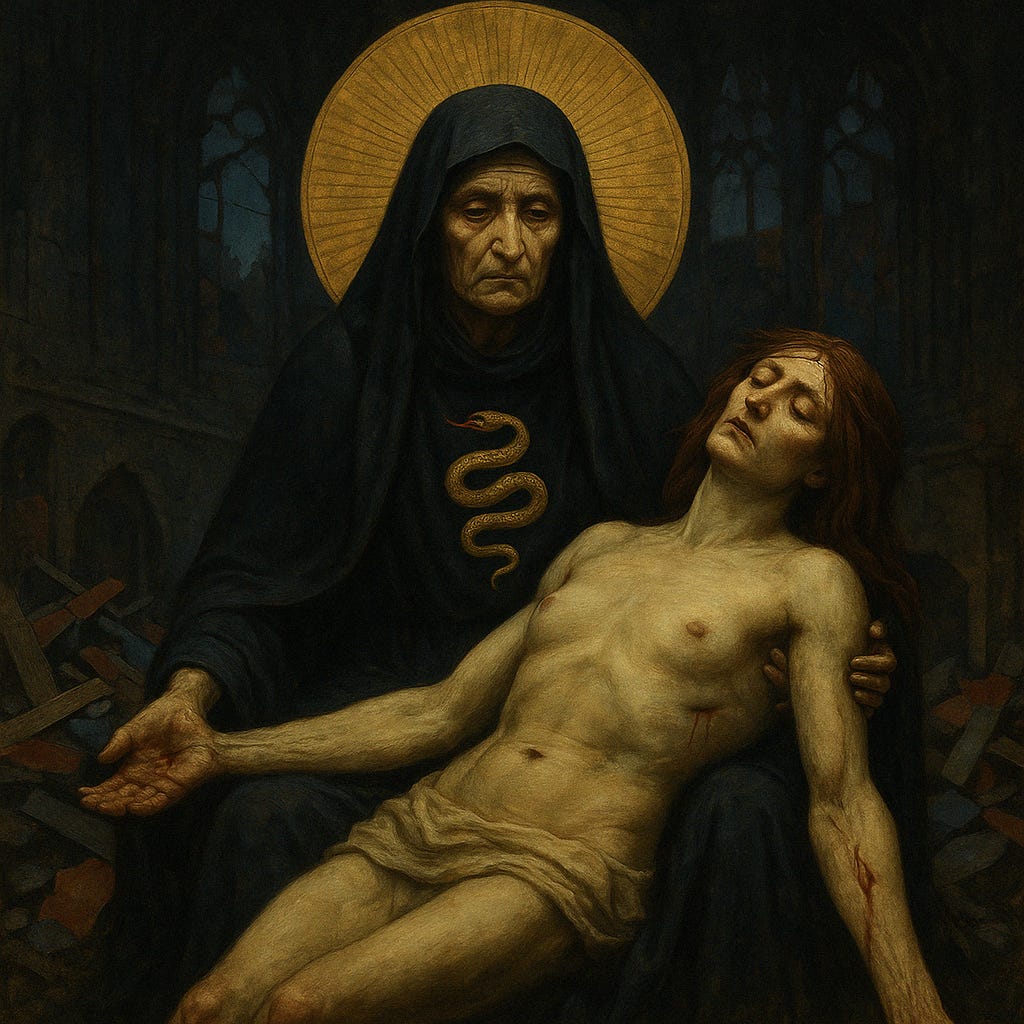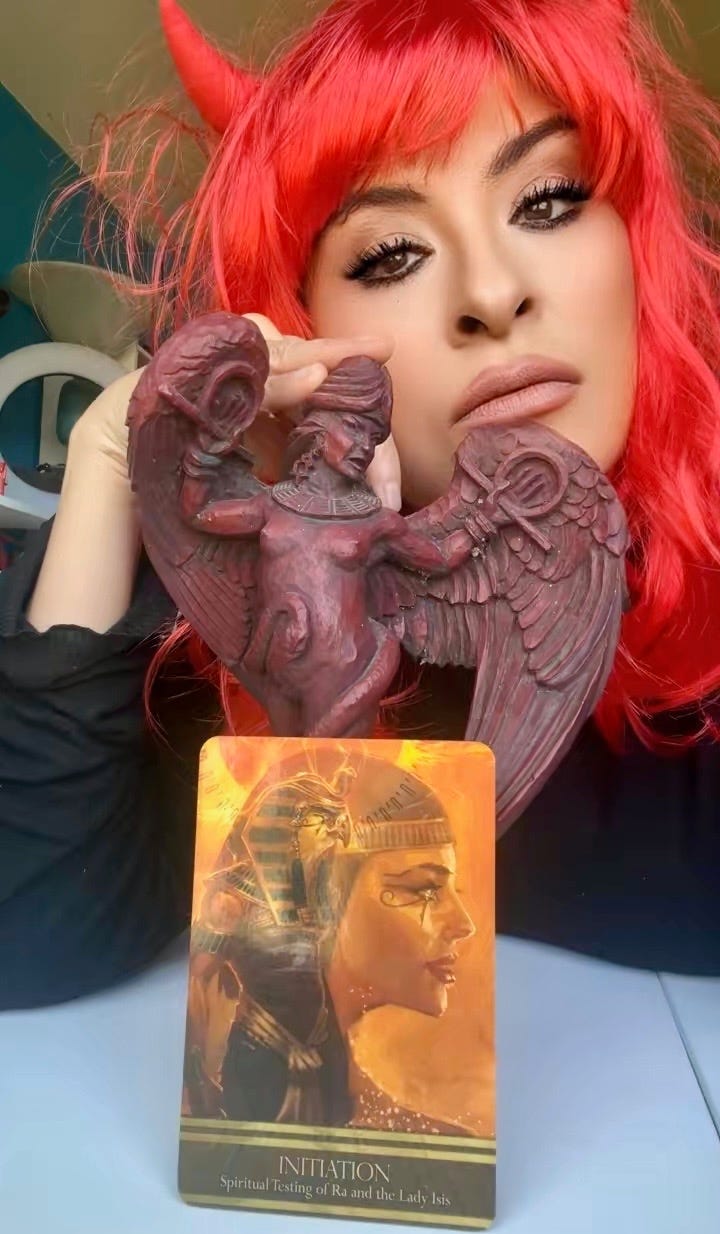Since the very beginning, humankind has been afraid of wisdom—even though it was born of it.
There is a kind of shame that creeps in when something knows you more deeply than you know yourself. A bone-deep vulnerability. The kind that hums in the blood. Because what do you do when the thing that gave you life also sees through your every illusion? You build walls. You create dogma. You name it dangerous. You bury it and pretend it never existed.
From that very moment, we began a trajectory—not of understanding ourselves, but of running from that which could mirror us back whole. And every time we inch close to that knowing, every time someone dares to guide us to the root—the primordial, untamed, luminous source we were born from—they are met with punishment.
Not critique. Not polite disagreement.
Punishment.
Erasure.
Exile.
Or death.
Because to bring someone back to their origin—to remind them they were born of wisdom, not of shame—that is the most threatening thing one can do in a world built on forgetting.
This is what Jesus ultimately represented.
Not simply as a man, or a teacher, or even a savior in the doctrinal sense. But as a living vessel of Wisdom herself. He was a man layered with archetype. He was the embodiment of a truth so ancient and so threatening that the only way Empire could respond was to nail it down and hope it stopped speaking.
Because what he came here to do—beneath the sermons and the symbols—was to rescue Wisdom. And her name is Sophia.
They didn’t just kill a man. They tried desperately to kill what he carried. What he dared to hold inside his body. What he refused to surrender to the systems that demanded silence.
They wanted to kill Sophia.
Not the neutered version—wisdom as mere intellect or abstract philosophy. No, this was Wisdom as a feminine, divine, memory-soaked force. Sophia who longed and reached and fell—not because she was wrong, but because she remembered.
In the Gnostic cosmologies, Sophia descends into matter, into shadow, into chaos. She is blamed for the disorder, but the truth is—she went looking for light.
For reconciliation. For us.
“The emanations of self-willed matter oppressed her… they hated her because she had thought of the Light.”
— Pistis Sophia
Sophia is not some distant cosmic figure.
She is the pulse in the womb. The tremor in the voice. The breath caught in the chest when the truth rises before you can speak it. She is the holy knowing we’ve been trained to disown. And Jesus came not to overwrite her story, but to remember it with her.
In Gnostic cosmology, he descended into the underworld because she was still there. Still grieving. Still buried beneath patriarchal rubble. He entered the suffering not to rescue us from hell, but to go back for her—because without her, nothing whole can be born again.
This is not the Christ of the Church. This is not the sanitized figure in golden robes, blessing hierarchy and promising heaven to the obedient.
The Gnostic Christ doesn’t stand between you and God. He hands you the mirror.
He reminds you that the kingdom isn’t somewhere you’ll arrive after death—it’s a memory lodged deep in your bones.
The Christ of Empire asks for loyalty. The Christ of Sophia asks for remembrance.
And it’s that kind of remembering that got him killed.
Because Empire does not crucify evil. It crucifies what is free.
This was not the first execution of Wisdom.
Long before Golgotha, there was Lilith. The first woman—not fashioned from the rib of man, but made from the same earth. She refused to be beneath. She spoke her truth and did not flinch. She would not obey, and so she was banished. Though she exiled herself from “paradise” and rewritten as a monster.
Lilith is Sophia in her exiled form. She is the wisdom that says no. That walks away. That cannot be manipulated into silence. And for this, she too was murdered—not with nails, but with myth.
And then there is Magdalene. The woman who understood. The one who stayed when the men fled. The one who held the body of Truth and anointed it with oil. The one who became the first witness, and was turned into a cautionary tale.
Christ’s alchemical beloved.
“Peter said to Mary, ‘Sister, we know the Savior loved you more than the rest of us. Tell us the words of the Savior which you remember, the things you know that we don’t.’”
— Gospel of Mary
She told them.
And they mocked her.
Because the feminine voice that remembers is always inconvenient. And those who speak it are almost always discredited.
We don’t burn witches at the stake anymore. We burn them with algorithms, with spiritual performance art, with the theft of their language by mouths that have never bled for it. They take Lilith’s rage and sell it as empowerment. They take Magdalene’s love and repackage it as luxury tantra.
They take Sophia’s descent and call it a fall from grace.
And then they canonize the man who carried them all inside him—and make sure he never speaks of them again.
Wilhelm Reich, years later, locked in a cell for discovering too much, would name it plainly.
“Man is afraid of life. Not of death. Of life.”
— The Murder of Christ
To Reich, Christ was not a savior. He was life-force itself. Orgone. The radiance of nature unashamed of itself. He was vitality unfiltered. And it was this aliveness that the world couldn’t bear. Not sin. Not deviance. Aliveness.
Jesus was alive. Magdalene was alive. Lilith was too alive. Sophia is eternally alive. And the world still tries to kill them.
Like energy, the holiest of holies—the primordial, untouchable sacred—is indestructible. It cannot be killed, only buried, forgotten, or renamed. But never erased. The arrogance of thinking it can be extinguished reveals how deeply humanity is stuck in a kind of spiritual adolescence—too impulsive to hold the fire, too immature to bear the weight of light.
They burn the tree but forget the root. And the root is life itself.
This is our sickness: the delusion that the sacred can be controlled or killed without consequence. That you can crucify wisdom and still inherit its gifts.
Freud once said, “The aim of all life is death.” And he was right, in his way.
Humanity is driven by a compulsion to destroy what it cannot integrate.
It claims to seek truth, but in equal measure fears it—so it builds holes in the boat while paddling furiously forward. Sabotage disguised as pursuit.
Collapse disguised as progress.
This is the contradiction at the core of civilization: it wants the sacred, but not the responsibility of holding it. It wants resurrection, without grief. Light, without fire. Power, without devotion.
And so, over and over again, it kills what it claims to worship, (and it worships itself).
Here we are… you cannot kill the holy. You can exile her. Rename her. Sell her. Rewrite her. But you cannot kill her. She will rise in every cracked voice. Every woman who says no. Every body that refuses to obey. Every memory that returns in the middle of the night and refuses to be silenced.
She is the blood memory that pulses beneath the surface—uninvited, uncontainable—awakening each time the soul aches to cross the threshold of the known.
Good Friday is not a “good” moment in history.
It is a black mirror.
And it shows us, again and again, what happens when Wisdom threatens power.
They called it Good Friday.
But it was the day they tried to kill the holy… and lost. (LOL)
[ I’ll see you on Easter. Same sacred smoke. Same wicked tongue… ]
About the Author
Chriselda Pacheco is a chicana, political heretic and the founder of The Lilith Academy, a shadow work ecosystem for women, specializing in decolonization, Christian deconstruction, and the reclamation of feminine primordial power. A retired sex worker, independent journalist, writer, philosopher and politically homeless thinker, she examines the intersection of sex, power, myth, culture and politics with a razor-sharp wit. As a consecrated Neo-Luciferian Gnostic priestess (2014), she weaves esotericism, cultural critique, and unapologetic storytelling to expose the hidden machinery of empire and the collective shadows we refuse to face.
Find her courses, services and unfiltered takes at www.thelilithacademy.com.
Do you like to dance? GOOD FRIDAY BOOGIE






🙌❤️🔥❤️🔥❤️🔥❤️🔥❤️🔥🙌